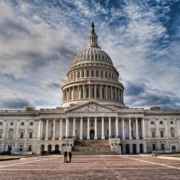How to Turn the Power of the Wall Street Protests into Real Reforms
by Brent Blackwelder
 As the Wall Street protests have spread from New York City to the rest of the country, some media pundits have criticized the protesters for being unfocused — as if there were only one thing wrong with the financial sector of the U.S. economy. The protests have provided a welcome response to Wall Street’s massive takeover of governance, and continued opposition to the status quo could produce opportunities to enact real reforms.
As the Wall Street protests have spread from New York City to the rest of the country, some media pundits have criticized the protesters for being unfocused — as if there were only one thing wrong with the financial sector of the U.S. economy. The protests have provided a welcome response to Wall Street’s massive takeover of governance, and continued opposition to the status quo could produce opportunities to enact real reforms.
Don’t expect Wall Street to undertake such reforms voluntarily — some of the shady practices are too profitable. It’s going to take new laws, and key legislation is pending in Congress that could provide important remedies. But new legislation won’t pass without the strongest pressure. That’s where the protesters could make a difference, especially with some forceful activity in the districts where the obstructionists, like House Majority Leader Eric Cantor from Virginia, reside. Cantor said to the conservative Values Voter conference: “I, for one, am increasingly concerned about the growing mobs occupying Wall Street” but he backtracked a week later when cautioned by his political finger-in-the-wind testers about the growing popularity of the protests.
Among all the morally bankrupt practices on Wall Street, there’s one in particular that would be easy to abolish. Easy, that is, if we can translate some the energy of the protests into pressure on lawmakers. Pending in Congress are powerful bills such as Senator Levin’s S. 1346 (Stop Tax Haven Abuse Act of 2011) that would strike hard at tax dodgers. But a bill like that has no prayer of passage unless representatives like Cantor feel the pressure.
Instead of reform, Congress is in fact poised to give another “one-time only” tax holiday to companies that stashed profits in tax havens. Huge and wealthy U.S. corporations are actively seeking what is known as a “repatriation holiday” because they say it would create jobs. Such a holiday would allow them to bring home offshore profits at a reduced rate — a nice holiday for the well-to-do CEOs and shareholders, while the rest of us taxpayers suffer the consequences of losing $80 billion of revenue.
The Tax Justice Network and a number of small business associations are trying to right this wrong. They have sent a letter to Congress to dispute this repatriation holiday, noting: “Too many corporations have turned their tax departments into profit centers, using aggressive accounting manipulation to disguise U.S. profits as foreign profits.”
Bloomberg Business Week has pointed out prime examples: Google reduced its income taxes by about $3.1 billion over three years — first by shifting income to Ireland, then to the Netherlands, and finally to Bermuda. Another example is Forest Laboratories, a company that sells over 99% of its drugs in the U.S. but attributes the bulk of its profits to a law office in Bermuda.
Corporate abuses are all the more frustrating in light of how the Congressional “Supercommittee” is discussing the deficit. The Supercommittee is poised to recommend draconian cuts in important programs, but its Republican members are unwilling to address tax havens and tax dodgers that cost the U.S. Treasury an estimated $100 billion per year. The two biggest banks benefiting from taxpayer bailouts are Citigroup with 427 subsidiaries in tax havens and Bank of America with 115.
A recent report by the Institute for Policy Studies (IPS) adds more grist to the protesters’ mill. The report notes that the salary of chief executives (CEOs) of the S&P 500 soared 27.8% in 2010 to $10.8 million, making the ratio between average CEO pay and average U.S. worker pay now 325 to 1. Back in the good old days of 2009, the ratio was much more equitable at “only” 263 to 1. The IPS study found that 25 of the top 100 CEOs received more pay than their companies paid in federal income tax. Furthermore, 20 of these 25 companies spent more on lobbying than they paid in federal income tax.
One more recent analysis, published in the journal of the Association for Psychological Science, provides new support for those advocating major reforms in the tax code. The analysis found that those countries with the most progressive tax codes (those that are the exact opposite of a flat tax where everyone regardless of income pays the same rate) had the highest happiness ratings.
Americans want a sustainable and fair economy. But we won’t get one without fundamental financial reforms and a clamp-down on tax dodgers. And we won’t get that without applying pressure to lawmakers and corporations. Now that’s a good focus for a protest.





I agree, but what good can these reforms really do if they aren’t accompanied by an alternative to the dominant economic paradigm of infinite growth? And what would happen if these reforms would come about without changing the dominant economic paradigm of infinite growth. I’d guess the economy would simply implode and the entire structure of society collapse.
My fear is that the OWS/99% movement’s aim is taking away the benefits of growth (wealth) away from the rich, so they can be distributed to the 99%. So after that we keep growing as usual, but with better regulation, etc, etc. This is not a durable solution IMO.
I agree with you, Neven. And although I can’t speak for Brent, I’m sure he would agree too. All you need to do is look at his previous articles, and you’ll see it. I’m guessing that he believes tax reform is a necessary lever to pull in order to make the transition to a steady state economy.
Thanks,
Rob
I believe that there are a number of steps, including “intelligent repatriation”, which no one is talking about, that need to be taken before a “steady state” is even a remote possibility. This step, among many others, is necessary to bring us back from the abyss, and if accomplished, can help lay the foundations for a steady state economy.
Repatriation is only a desirable goal IF the legislation states clearly:
A. This is the last opportunity to do so, period. And you have only a six month window of opportunity to take advantage of this opportunity, Period.
B. If you repatriate the funds within the time sequence, AND if the funds are applied to a very narrow description of acceptable uses (long-term capitol investment only, not speculation), then the funds will be taxed at 15% as an example.
C. Acceptable uses are limited to the following: Only long term (minimum two years of holding) capital investments in approved categories of industrial (job producing) development, either in the bond market or in your own domestic production facilities.
D. At the end of the time window, the IRS will change rules, and ALL un-repatriated funds WILL be considered pure net profits, and will be taxed at the current statutory rate of 35% with NO write-offs, loopholes, job costing, foreign tax credits or exemptions applicable, period. Any corporation taking steps to circumvent this legislation, will automatically lose their corporate status in the USA, and will be subject to the trade laws and tariffs applicable to foreign companies. Period.
This would eliminate the big bugaboo of “Uncertainty”, which is apparently paralyzing multi-national “job creators”.
There are about 20 other systemic changes that need to occur, including perhaps a completely different treatment (federal licensing and regulation) of corporations buying and selling internationally, as opposed to the much greater majority of “domestic” corporations, which are regulated (badly) at the state level. Corporations need to acknowledge their “Citizenship” in one country only for trade purposes. They may not engage in any activity to circumvent taxes and trade duties, at the risk of prosecution and forfeiture of all corporate assets.
“Globalization” historically has not and never will operate to the ultimate benefit of American workers. There are strong arguments that the benefits to 3rd world workers are not outweighed by the disadvantages. NAFTA managed to hurt both American and Mexican workers.
“Short-Term Highly-Leveraged Speculation” in any market is a destructive, morally repugnant, and ultimately dangerous activity, and is perhaps the epitome of the enemy of any “steady state”. It is without question symbolic of a “growth” or “profit without valued added” mentality, that when combined with the watery-boweled fear inherent in the “leveraged” aspect, is guaranteed to provide the “bust” component of any “growth at any cost” economy or social policy.
Speculation (gambling) in commodities, real estate and securities markets will have to be eliminated in any Steady State, either by criminalization or taxing it to the extent that it loses all appeal to the participants. Speculation diverts unbelievable amounts of capital from legitimate long-term investment, which ultimately kills industry, entrepreneurial efforts and it kills jobs.
I have repeatedly asked the question… Is there any economist (outside of Wall Street’s grasp) who can provide concrete PROOF that speculative activities (derivatives, CDS’s, short selling, hedging) are absolutely necessary to the function of our economy, AND that those activities create value that out-weighs the damages caused by speculation.
I agree with you, Neven. And although I can’t speak for Brent, I’m sure he would agree too. All you need to do is look at his previous articles, and you’ll see it.
Sure, Rob. I’ve read practically all of Brent’s excellent articles here, so I know what he stands for. I just tried to kick off the discussion a bit. :-)
I’m of the opinion that whatever reforms the OWS/99% movement proposes, they all need to be clustered around the central message that the current economic paradigm needs to be replaced. It’s not either/or, it’s and/and, but only if that central message is there to bind all the pieces of the grievance puzzle together. Anyway, I’ve tried to express my thoughts on this in an article I wrote for Planet 3.0: Rebels without a root cause.